Robert Popper interview
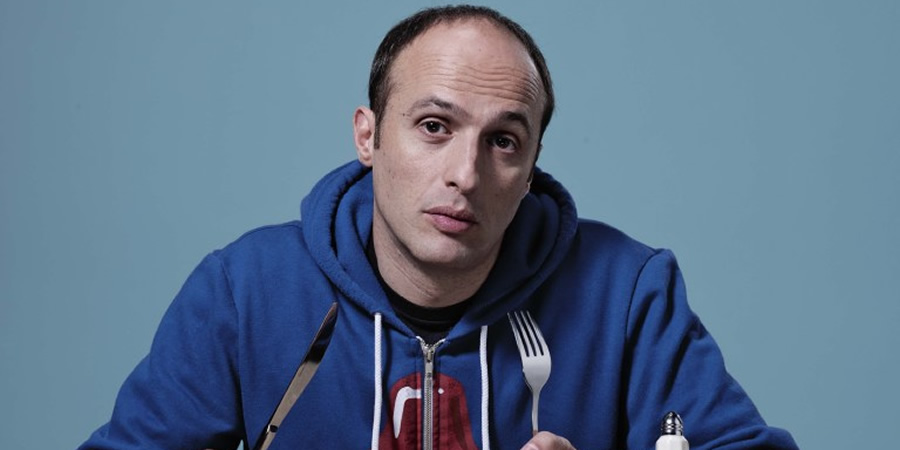
As Friday Night Dinner returns for a sixth series, we chat to creator Robert Popper about writing and producing the show.
With everyone indoors, an ideal time to be launching a new series of a great sitcom?
Thank you! Well, I mean - bittersweet, I guess, isn't it? I don't want people watching it stuck at home just because they can't go out!
What can fans expect from the new series?
I think it's gonna be more extreme. Yes, it feels a bit more extreme than ever. It's quite an extreme show, I think in terms of, you know, the relationships and stuff like that. So there are definitely a couple of surprises.
Horrible Grandma's back with the world's worst argument - a great argument rages throughout the house. And we'll see what happens with Jim now that he's lost Wilson.
How does it feel to reach Series 6? This must now be just about the longest running ongoing British sitcom, apart from Not Going Out.
Yeah, it's mad! Whenever you do one you always think "oh I won't get another series" and then they give you another series and you think "well I won't get another one". So it's kind of weird.
Yeah, it is weird. It's all a bit of a blur. I mean, it's nice; you know, I thought 'if I'm lucky I'd get two series, maybe three', and - yeah, we've got six! So that's good.
I didn't think I'd be writing this sitcom for so long but, you know, I really enjoy it. I've an incredible cast, and a brilliant director in Martin Dennis. It's always great fun.
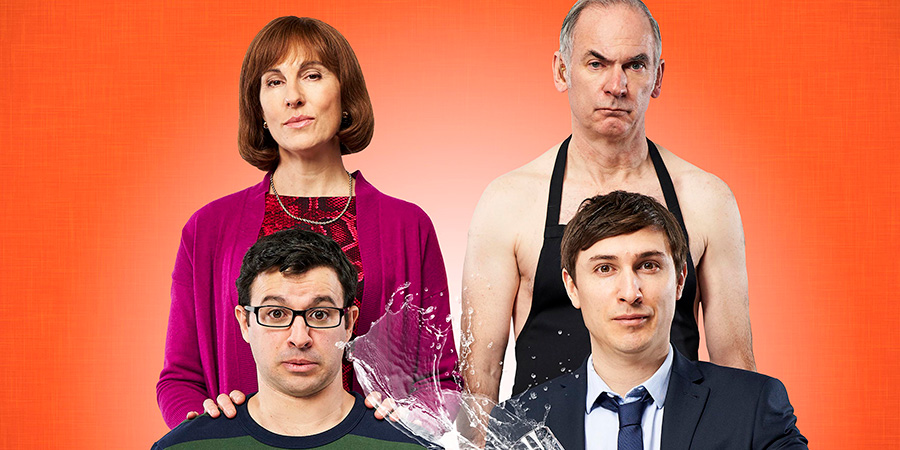
How have you faced the pressures of coming out with new scenarios each series? It feels like we see the family venturing away from the house a bit more now.
I don't know. I think this series they leave less than ever.
It wasn't a thing I set out to do, because - when I sit down to write an episode - I generally don't really know what the episode's going to be about. I don't really plot the whole series out.
As I'm writing, I get a general sense if there's a mini arc or something like that, but it's often literally me sitting down... 'Right, I've done one episode. What's the next one?', and going through my lists of ideas - you know, all my thoughts I've ever had.
I'll see if anything there sparks something, and also just keeping my ears open to funny things I hear, or if someone says something happened to someone, or a funny thing that happened to me... because I've used most of my family stories already.
It has been hard to come up with new things; it takes me about six months to write a series, and in that time, so far, I've managed to do it, so this time I was a bit easier on myself thinking 'it's gonna be okay, the ideas will come'... and they did, thank god.
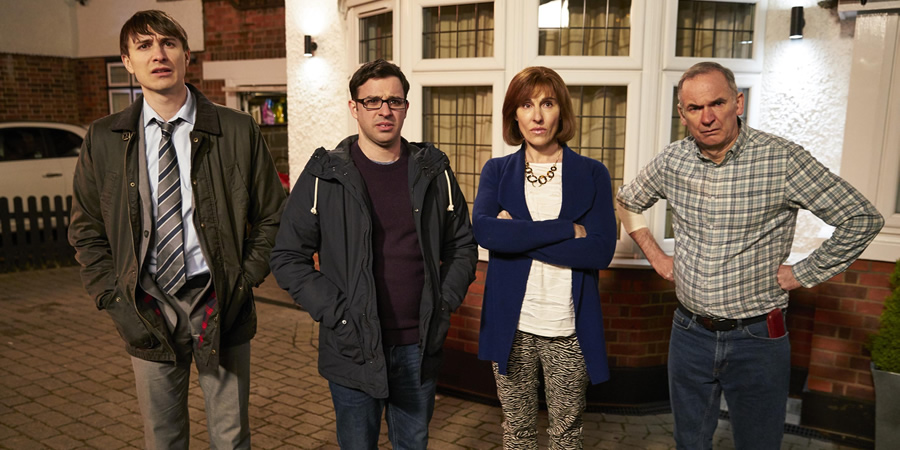
What is your actual writing process then?
Well, I tend to write from my house or I write in the British Library in London. And normally, like a first month of sort of mucking around, thinking of ideas, scribbling things up putting some cards up on my wall, which I then forget to look at. And then it's like, 'okay, let's start'...
It's normally led by concepts, really. So in Episode 2, the concept is, there's a plastic bag in the tree and Dad wants to get it down. So that's, I think, a funny concept, and how extreme can I make it? Where can it go?
I'll need a good, strong beginning. And I need to know where my end is. And I need to know a few things in the middle, and then I kind of just start writing things sort-of wherever it takes me. I normally get stuck about third of the way through, for about a week, and go "I'll never finish this" and then I just bumble my way through, somehow get to the end, and then it's rewrite, rewrite, rewrite, rewrite. Twenty-five drafts, or whatever I do.
I have two great executive producers, Kenton Allen and Caroline Leddy. Caroline's on the end of the phone, I can talk to her a few times a week, send her stuff. And then that's how it gets done. Then it's on to the next one, which is normally "I don't know what it's gonna be. How am I ever gonna do this?" And then I do it. That's all that happens, every time.
So you're averaging about one episode a month?
I think it's about one every five weeks. Writing is about 22 days. I mean, I've worked it out mathematically because you know, that's what you do. You waste your time doing things like that!
One storyline features an item of clothing that crosses over heavily into the actors' real lives. How much have they influenced their characters as the series has continued?
Well, they're such good actors, they can sort of do anything. I think I've realised it took me till about this series really to boil down the four boys down into one word each. So Adam's sarcastic. Jonny's a dick. So you go: okay, yeah, that's them, okay. You know, sometimes you realise "that's who they are" quite late into it.
The thing is, they're really brilliant actors. So I don't really have to write to their limitations, they can sort of do anything they could physically. And they feel like a family. I just really like to put them all under pressure, you know, as a family. I like when they ping off each other. Particularly in this series - they're kind of crazy, really intense - I just wanted to make it even more intense than ever.
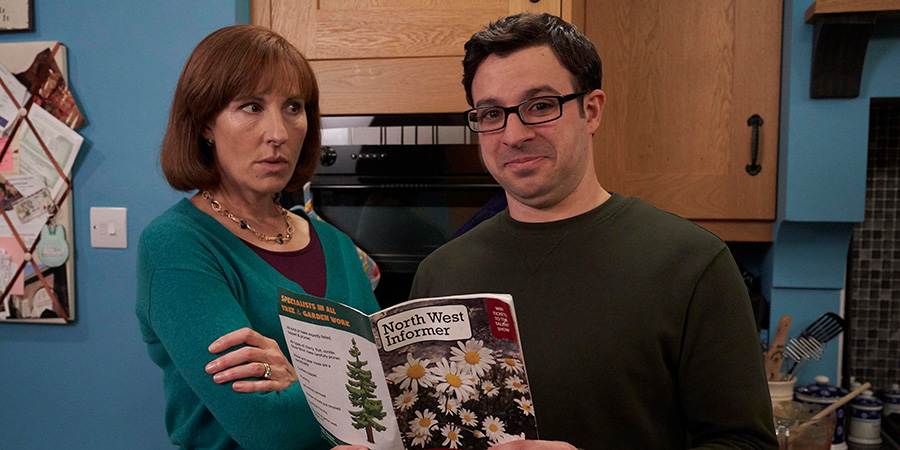
Is there anything you've been unable to put them through yet, perhaps due to budgetary constraints?
That's a really good question. I mean, there's been scenes I've written, lines I've written, that I try to get them in every series and in the end we cut them.
There's a joke about Jim, which we did in Episode 3 with Sally Phillips. She plays the former au pair, Swiss-German, she's brilliant, but the boys just have no memory of. And she's really odd, obsessed with cream teas because he had one once 25 years ago and just wants a cream tea. She's incredibly emotional and yeah, she's fantastic...
I had a line in Series 1 which was a Jim line about Switzerland. And I realised I've now got a Swiss au pair I can put it in! And we filmed it, but in the edit room we go "it's funny but it's not helping the story". It was Jim talking about Switzerland, saying, they have it all really: Swiss chocolate, Swiss cheese, "and the little box with a little bird in them". Dad says "cuckoo clocks". Jim says, "very cruel". That's one of my favourite little bits. And he performed it fantastically, but you know, you have to cut your good things to make it all flow. "Yeah, that's great, but the scene's too long now," so that never went in.
Do you have any particular ambitions for the future? Or do you just take each series as it comes?
I just take them as they come really. When the series ends, I don't really think "what am I gonna do next series" or "what happens next". Because it's sort of reset each week. When I sit down, as I said, I just don't really know what I'm going to write about, which I quite like for this series. So yeah, I don't think "ah, they're gonna do this, they're gonna do that". There's a kind of an epic last episode of this series, which leads up to the finale.
That sounds like it's probably the most sensible way to approach writing for your own sanity, because obviously there will be a point when someone says "no, let's not do any more", so if you're thinking ahead...
Yeah, it could be! I have to think 'do I want to do more or not?'
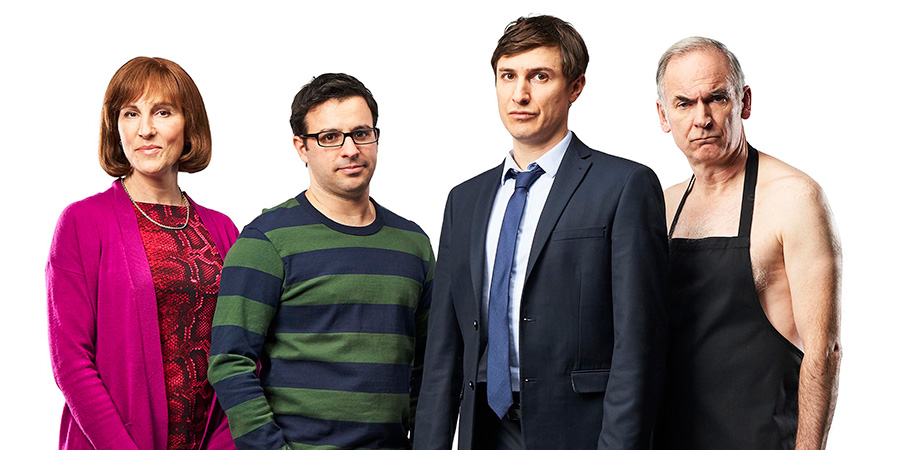
What are your own sitcom favourites? Which shows and comedians inspired you to become involved in comedy?
Well, Fawlty Towers, which is my favourite.
Then, you know, Steve Coogan, The Day Today, On The Hour. Monty Python, obviously.
I mean, there are so many great sitcoms. When I was a kid I loved things like Dad's Army, Rising Damp, Reggie Perrin...
What do I watch now? I love This Country, which is incredible.
Is there a real separation between your roles as writer and producer once production actually begins? Do you do start making changes to the script on set? How do you juggle those differing commitments under the two roles?
Well I suppose, as a producer, I'm like the creative producer, which means I sort of creatively run the show. Obviously, I don't do it single-handedly, it's a great team that makes the show.
I'm not there going through every line of the budget. Although I know I have to write 'boringly' - that something might be expensive. You sort of know that, I think, when you write. "I'm not going to do that, we will never be able to afford that, so I won't do that but I could do this".
In terms of once the scripts are done, and you have all your notes, we'll have a big read through with all the cast reading all the six scripts through in front of Channel 4 etc, and you get your final notes, and then we do rehearsals.
We do an episode a day. And we'll sit and read it first. See if anyone has any thoughts, any line changes, and then we'll put it on its feet and things come up as we run through. Boring things like "oh, I need two more lines whilst I'm walking from here to the kitchen". So what could they be? And someone might say, "How about this?" Oh, that's great. So they get tweaks.
And then when we're filming, generally it doesn't change. It might change a tiny little bit in terms of losing one line here or changing that, but it's not I'm not rewriting on set.
Sometimes you have to [rewrite on set], when you realise you're not going to finish filming today. Maybe the scene is two pages, but we could probably do it in a page. And instead of being in the car they're getting out the car, things like that. Sometimes you have to rewrite really quickly. "Okay, what are we going to do? We've got forty minutes to film this."... otherwise you won't get on. It's just horrible.
You mentioned writing and thinking about the budget there. Obviously, some things are going to be obvious to any writer, but do you think having the producer's oversight helps as a writer as well?
Yeah, it does. Because, you know, if you're facing those in charge of the different departments - costume and this and that - you have to think practically.
On the day, you have to think while you're there [on set]... so not only am I looking at the script I'm writing, and thinking about the actors performing right, you have to keep all your departments happy, everyone happy.
The main thing is keeping a happy, fun atmosphere on the set in order to make comedy. Filming is such an intense thing. We're in the house, 50 people in the house, so no one has any room at all at any time. And you go sort of crazy.
We're there for 36 days in one small house. How do you keep the actors 'up'? A lot of this really juggling people's emotions, and making sure everyone's happy. That's kind of the main thing while you're on set really, apart from the obvious: the director making sure you've got the shots, and it's coming out how you want it, and the performances are right.
When filming ends, I'm sad it's ended but I'm also so happy it's ended because it's such an intense, stressful, exhausting, you know, two months. The edit is then where you get to sit around and muck around. Three of us going mad in a room.
And it's all shot in that one small, real house? There's no studio?
It's a real house, yeah. A lady lives there. She's lovely and she moves out. And we go in and we decorate her house how we want it. And then we have, you know, 50 people in the house. The house gets bashed about, then we finish, we repair the house, and she moves back in.
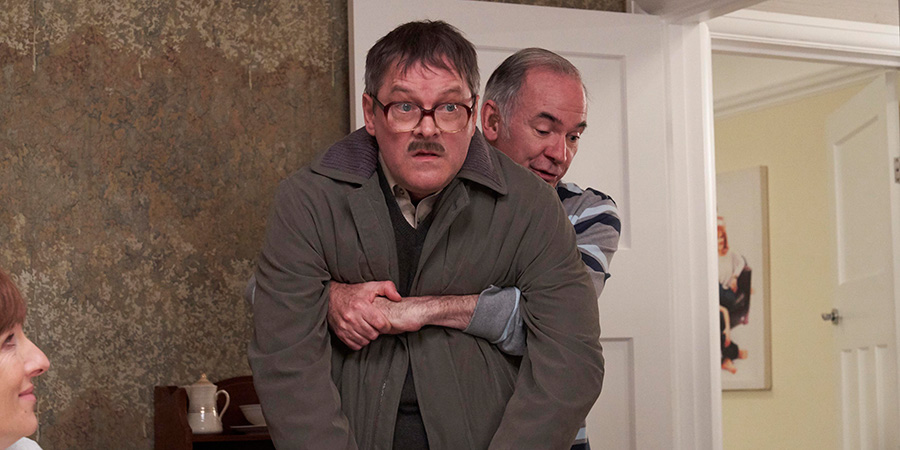
The show feels like the perfect set up that could be expanded into a feature film. Do you think there's any chance of seeing the Goodmans on the silver at screen some point?
On the silver screen? Maybe on the bronze screen!
I dunno, I don't think so. The Inbetweeners got it right, but they're rarely good when they go from TV to film.
I don't know. Possibly. I did have a sort of idea for one but then I thought "I just want to watch it for 30 minutes, not 80 minutes".
How important is the Jewishness of the family to you? Is it more incidental to the characters or is it really at the core?
It's about a Jewish family, but I didn't really want to make it explicitly Jewish. I think we've got the level right in terms of occasionally you hear the odd Jewish word, "mazel tov".
I mean, "shalom"... Jewish people don't say shalom to each other, it's just a saying in Israel meaning hello. But the Goodmans do, obviously to take the piss out of Jim, who's sort of overly reverential about their Jewishness. I find that really funny.
Often on a Friday night you might light candles and say a prayer, for example. And I originally wrote one to go in, but that's all in Hebrew and it's hard to make funny. Do you know what I mean? If it's slightly too alien for people they won't know, and when you try to subvert it they might not get what you're trying to subvert.
It's not that I had a burning desire to represent Jewish people on television, that wasn't my thing. Whenever I've ever seen sort-of Jewish things, it was either very stereotypical or it's Yiddish violin music and soft focus. I just thought "well, they're Jewish, big deal!".
The family are like everyone else. This is their equivalent to a Sunday lunch. This is what a lot of Jewish people do, go and see their parents on a Friday night and have a meal and argue. Just like people when they go see their family, and the main thing was realising, when you go home, everyone reverts to being 12 again! That was the concept behind the show, apart from it being a family who meet every week.
I think we can all sort of relate to just reverting to being young kids again. Similarly, mum would revert to being the daughter when Grandma was there. There's that argument where Grandma tells her to go to her room, which is a real thing that happened in my house, my grandma telling my mum to go to her a room! "This is my bloody house, I'm not going to my room!"... "You go to your room!"... "I don't have a room". I just knew that one was gonna go in!
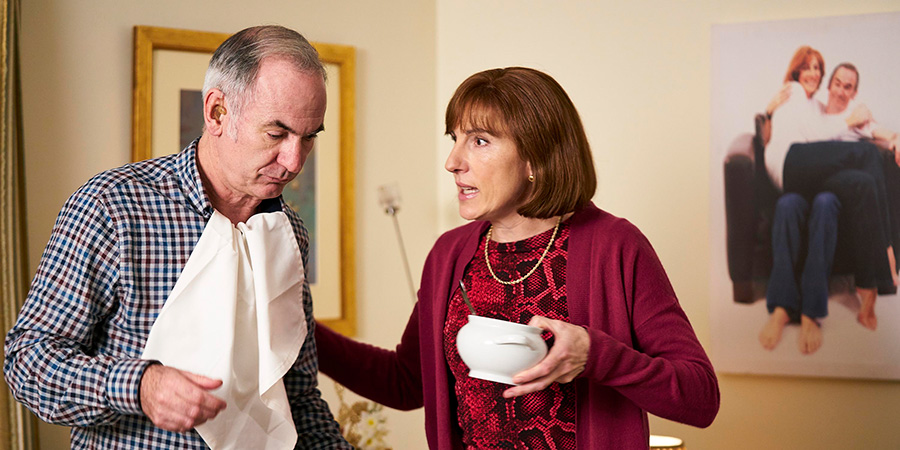
We noticed that between episodes, and at different points in each episode, there's always one character who is the sane one and everyone else is going mad. Dad is always insane. But of Jonny, Adam and Mum, it switches between them. Do you consider that kind of dynamic in the show?
I've never noticed that but I like that you have! I guess it's there! No, I don't really. I think I probably try and make sure that they've all got interesting things to do in the series. So there might be one where I think maybe this needs to be a bit more Mum-heavy or just Mum being more proactive. Or thinking there's not really been one for Jonny, so thinking "oh, this'll be really good for him to be taking the main story" so maybe that's what happens.
Do you have any advice to aspiring writers who are hoping to get a foothold in the industry and try and get their first sitcom written?
No, none! I suppose just write what makes you laugh. Always write what you think's funny, not what someone else might think is funny. You know don't like what you think people are gonna like! You have to want to write something you really want to write and you find really funny.
When I write, I normally have a few things in my mind, starting with "what is the story?". I might be just writing stuff; it might be quite funny, but it's not taking the story anywhere, so it's getting boring... and then I read back and go, "oh, I can't remember what the story is now". And if I can't remember, then people watching won't remember, and they'll get bored and turn over. That's also tied to "why am I watching? What's keeping me watching this programme?"
And then it's always "is it funny?", I suppose. But the first two are probably harder than the funny bit I think. If you're a funny person, you normally can write things that are funny - funny lines and things - but it's also how to keep a good story going in a sitcom.
It's the story really that's the hardest thing I think. So I always think I can probably make it funny, but how am I going to crack the story because there's always a jigsaw, really, that's the hardest.
How do I get from that bit to the end? How am I gonna make that bit work logistically?, etc. And how do I seed in information that's useful for later without it sounding like I'm giving you information; how do I hide things? You know? How do I keep people surprised? Or maybe I don't want to surprise them, maybe... I want them to know what's going to happen. And then it doesn't or it does happen.
It's all that playing with emotion. I'm talking about me now, but maybe for other people too, it's always about what feeling you're giving the viewers really. I think that's what it is. It is about playing with their emotions anyway. Taking them on the story. So what do you want them to feel here? And are they feeling that? Or is it confusing? Is it clear? Are all those sort of things for this story clear?
I'm probably babbling but those are the things that go through my mind the whole time... every line I bloody write, and it drives me mad!
Similarly, when you're editing it. That's the thing. Is the story clear? That's when you chop things. "Well, that's funny, but it's in the way, it's confusing, or it's not helping, so goodbye."

